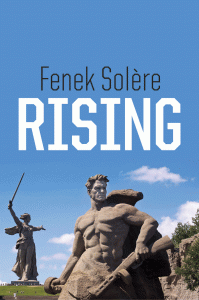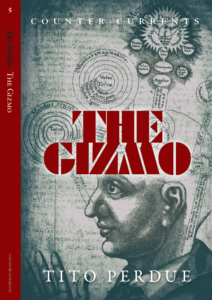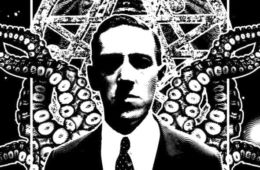A Christmas Curry, Part 2
Part 2 of 2 (Part 1 here)
I enjoyed my mango milkshake. It was frothy, and sweet, and its chill was a welcome conclusion to the curry and assorted spices. I gave up trying to figure out Fetoosh, wondering if he was good in bed. Around us, tables began to empty. The families pushed in their chairs, the mothers holding drowsy infants. Dishes clattered as the busboy cleaned off the tables.
“Look,” Chandra said to an attentive Fetoosh. “Jews borrow. Okay, they grab here and there. The sin thing? Read The Book of the Dead. From ancient Egypt. When you died, you faced judgement as Thoth, the Ibis-headed god, who weighed your heart against the feather of truth. You confessed your sins to Osiris, the Lord of the Dead. If you lied, you were fed to the Great Devourer, a crocodile-like monster. Real moral and nasty, n’est pas? But — ” Her index finger went up. “ — this chapter is followed by chapter after chapter telling you how to lie to the 42 judges of the dead, how to con Osiris, fool the Devourer, cheat on the finals, and make it to the Happy Land . . . all with an airtight alibi.” She shrugged. “The Jews got their haggling from the Egyptians. Taught ‘em all about it. The rubes from wherever learned how to con from the big kids.”
I joined Chandra in a mild, full-court press. “Religions in that part of the world seem to dig a nasty, omniscient , demanding God. But also offer ways to bamboozle him.”
“Much like their history of Solomon, David, the glittering glory . . .” I smiled. “It was all made up. There is no archeological evidence of any great kingdom or temple. The Jews got it from their captivity in Persia and Babylon. They created a myth.”
“Of course,” Fetoosh said, warming to the conversation. “The captivity they wail about. They learned so much greatness from Persia.” He stretched. “We were the best thing that ever happened to them.”
“So you admit you’re Iranian?”
Fetoosh smiled and shrugged.

You can buy Fenek Solère’s novel Rising here
“The point is,” Chandra interjected, “Jews borrow. From Egypt. Persia.”
“Don’t forget bagels,” I said. “From Germany.”
We smiled and clinked glasses. Fetoosh offered the last third of the carafe to Chandra, then carefully filled her glass as he looked at me. “Tell me, Steve, do you believe? In this Christmas? That the babe in the manger is a King who will ‘redeem’ the world?”
I sighed, wondering if this was my moment of judgement before a silk-suited Thoth. “I believe what Seneca said: ‘Religion is regarded by the common people as true, by the wise as false, and by the rulers as useful.”
“That good old Roman sensibility,” Chandra commented.
“Rationality.” Fetoosh’s tone indicated that he didn’t see that as exactly a virtue.
“No, I don’t accept the myth as it is. Christianity is a creation of a sect of Jewish zealots and world-weary Greeks. But it was like an idea whose time had come.” I smiled. “Like Star Wars. After seventies cinema, with Scorsese and Coppola and all that downbeat stuff, people were ready for — ”
“Funny stories,” Fetoosh finished.
I frowned. I was not exactly uneasy, but was spurning sensibility as wine made me probe beyond my bookstore- and college lecture-derived knowledge. “I think Christmas is a time of light. Of memory. Memories. We see the universe, and the skies as dark and empty. Akasha, as the Hindus call it. The stars and planets are light. They are something. Our memories are like those lights and heavenly bodies. Earth is a memory. I have memories of Christmas. Some are good or bad, but they help me to grow. Live.”
Chandra and Fetoosh watched me, unblinking.
“A Christmas Carol is all about memory,” I continued. “Scrooge recalls, remembers, and is happy at first, then sad. He will die in the end. But he wants to die with happy memories, knowing that he lived well. Was good to his employees. His nephew. It’s odd how Krishnamurti argues that true freedom comes from forgetting the past, because it is the cause of comparison and unhappiness, but the past is all we have. Every Christmas is a good, fulfilling memory, and it’s up to us to make the one before us another good one.” I sighed. These two people before me were my Christmas present. I hadn’t thought I would end up here, but here I was: well-fed, charmed and inquisitive. “I’m happy to be with both of you.”
Chandra’s foot touched mine under the table as she winked. Fetoosh nodded, hand on his chin. “Your Uncle Sam can go to hell,” he said genially, “but I enjoy your Santa Claus. He is a good god. It is good to have food, talk, and warmth. And light.”
Chandra smiled. “Akasha, eat your heart out.”
“Remember the revels?” I asked Chandra.
She nodded.
Fetoosh cocked his head. “Rebel?”
“Revels,” I clarified. “Christmas revels. A show here in Boston.”
“And elsewhere,” Chandra added, “where civilization and progressive thinking prevails. We take various aspects of Christmas and folk festivals and make a show. Song, dance, rituals.”
“Rituals of . . .?”
“Light,” I said. “It really was all pagan ceremonies for the solstice. To bring back the light.”
“Sure,” Chandra smiled. “I was in the show.”
“She was really in the show.”
“Three costume changes,” she beamed, fingers counting them off. “Renaissance, Spanish colonial, Victorian.” She shifted to stress her accent. “Veddy Victorian. ‘Milady, the mummers are without, and they have come a’caroling, and one of them has a most humorous rendition of Miss Houlihan’s Christmas Cake.’”
I laughed at Chandra, appreciating the ways in which she was born for the stage, and how I loved seeing her sing, dance, and ham it up.
Fetoosh made it clear he liked it as well. Was I passing her on?
“There’s an invocation we make,” Chandra said, now gesturing and spreading her hands as she spoke in a storybook voice. “So the shortest day came, and the year died, and down through all the centuries of the snow-white world came people singing and dancing to drive the darkness away. They lit candles, they decorated their homes with evergreen, they burned fires all night long to keep the year alive, and they shouted revelry throughout all the frosty ages of the shortest day, as they caroled, feasted, gave thanks, and dearly loved their friends, hoping for peace, as do we here. Now. This year and every year — ” She raised both her voice and the glass. “ — welcome Yule.”
“Welcome Yule!” Fetoosh and I toasted with the last swallow of our glasses. I looked into Chandra’s twinkling eyes as our glasses clinked. There was light at our table, there was memory, and we were happy.
By then the restaurant was almost empty. A nerdy student in the corner was grabbing her bag, no doubt ready to head home and work on her dissertation. Two students sat at another table, having a last smooch before they paid their tab and went to shack up. Then a waiter’s broom swept over my toe, warning me that our time was up.
“In Büchner’s play Danton,” I said, “the lead character said ‘my memories are my enemies.’ We have to avoid that.”
“Büchner” Fetoosh muttered, going for his coat. “He wrote . . .”
“Wozzeck. The play.”
“Ah. The movie.”
“The opera,” Chandra interjected. I helped her on with her coat — thick, black wool with brass buttons and a small cape.
“Yeah,” I said. “For a failed writer who committed suicide, Büchner gets around.”
“For failed artists,” Chandra warned as she tossed her fuzzy muffler around her throat, “death is always a good career move.”
I then left, waving goodbye as I gave the waiter my 20. It was my biggest bill, but I wanted to give him a good tip. I exited quickly, shouldering my bag. I could still make the last train to Boston, but felt like having a good walk to work off the meal. I didn’t want to wait on the platform with Chandra and Fetoosh, because it was clear that she was now last year’s news. I welcomed the darkness because you need it to appreciate the light; that struggle between light and dark, good and evil, courtesy of the Zororastrians. Another borrowing from Persia; thank you very much, Jews.
I sensed I had been at some kind of inquisition hosted by Chandra and Fetoosh. Years later, I heard that Chandra had gone into the corporate world or the CIA; I lost interest. Fetoosh will always remain mysterious. Was I being recruited on that night of Christmas curry as a possible asset? It would have been no real surprise, as Harvard, like Yale, was a huge spook factory. Did I fail the test? Was I, in their final analysis, deemed only a struggling writer from the Midwest, unable to be an effective cog in someone’s grandiose plan? Was it a real-life version of Kubrick’s Eyes Wide Shut, where correct behavior would have gotten me into the ominous, sensual, ruling-class ball? Fetoosh enjoyed my allusion to Star Wars, but Star Wars fans, like Trekkies, are a fertile breeding ground for spooks. Was my feather weighed before Thoth and found to be too heavy? Or was this simply a very impromptu, happy Christmas get-together with two people for whom I would only be a footnote in their lives?
Let’s believe that.
On my way back to Boston I passed Salem street, recalling the previous year, when Huntley and Shirley, two Canadian friends I had met in the anti-war movement, had invited me to their Christmas party. It was another happy night of talk, light, and faces.
* * *
It was roaring as Shirley let me in. “There’s someone you’ve got to meet,” she said, beaming. “She’s a poet from Ireland, and I know you’ll have a lot to talk about.”
“Where is she?”
“We’re waiting. She’s just coming in from Logan.”
In the meantime I helped myself to wine and finger food, ducking to avoid hitting Christmas decorations while a couple seriously payed homage to the mistletoe above their heads. Huntley, tall and ebullient, gave a warm hello, bouncing from group to group and enmeshed in intellectual discussion. He already looked like a professor, culling minds for a new lecture or paper.
Shirley introduced me to Cheryl, one of her fellow English as a second language teachers. All three of us discussed The Winter’s Tale, which we’d seen at The Huntington. Shirley then hurried off to check her fondue.
I spoke of my writing — or, as I explained to Cheryl, of what passed for it. She frowned. “Why do you denigrate yourself?”
I cradled my wine. “Because I don’t think it’s real, yet.”
“But you’re an intellectual.”
I smiled at that and leaned back on the couch. “I don’t think so. I just say the right phrases.”
“How can you say that? You spoke about Shakespeare, and you talked about Robert Greene, the source for The Winter’s Tale. It was pretty deep.” Cheryl sipped her gin. “You are an intellectual.”
I thought for a moment about how uneasy I felt talking about my writing with other people. Although I was devoted to writing, I was still in the closet about it with most people. “I don’t think so.”
Cheryl leaned forward. “You need to see a therapist,” she said in that stern way that crazy, disheveled ladies in St. Louis’ streets told me to find Jesus. But I enjoyed talking to her. She was teaching at Pine Manor, a swanky women’s college in Newton.
“I’ve heard stories,” I said.
Cheryl smiled. “What kind of stories?”
“That the girls are loose. It’s called ‘Pine Mattress.’”
Cheryl laughed, her hand covering her mouth. “Some of the girls are, shall we say, daring. You could have done on-location scenes from Risky Business there.” She smiled. “There would have been no lack of enthusiastic extras.”
Cheryl was quite happy with teaching and living here, describing dark memories of her life in South Dakota that clouded an otherwise contented past. So, she was another expatriate from the Midwest. She eventually moved on, as did I, to others quaffing, munching, and raising the conversation to high decibels. Shirley wanted to play charades, but there were no takers. Huntley was still engrossed in intellectual conversation. I conversed here and there, but also stayed in my familiar habit of watching and listening.

You can buy Tito Perdue’s The Gizmo here.
The poet finally arrived. Huntley and Shirley were quite excited. She entered; she was middle-aged, her eyes dull as she apologized. She had been on the plane a frightfully long time, and had to sack out. She left her presents, exchanged hugs, and then was out the door.
“Well,” Shirley said, looking at me, “I was . . . hoping for more. You would have had so much to talk about.”
I raised my glass. “I’m talking.”
Shirley’s bright, indulgent nod indicated that my brilliance had its limits. Then a pair of Chinese students got her attention. Arthur, a gray-bearded musicologist with a wise face, was explaining the importance of Mozart’s operas to Cheryl, demonstrating how the leitmotiv worked in Wagner, using West Side Story as an example of the form.
Cheryl listened intently, her eyes taking mental notes, shaking her head of immense, frizzy hair. She asked if Beethoven was the best composer. Arthur demurred with a smile. “Well, I suppose so.”
“You don’t think so?”
Arthur was sage and . . . intellectual. “I like him, but Bartók . . .”
Since Shirley forbade smoking, some of the couples went out onto the back porch to light up. Huntley and I discussed his job interviews for an economics professorship. I’d gotten the idea of taking a vacation to Mexico. We talked of that while sipping champagne, as well as about Venezuela, where he and Shirley would vacation in January.
Then I met Katherine. She had caught my eye earlier: black spandex stretched tight against excellent legs; a black shirtdress; long, raven-black hair; abundant jewelry and mascara. It didn’t surprise me that she introduced herself as a writer. “A real writer,” I added, smiling, as she finished describing the four film scripts to her credit.
“But you’re a writer, too.”
“I don’t think so. At least not until I get published.”
Katherine smiled back. “That’s irrelevant. Writing is for its own sake. I have written a lot of stories , but I won’t publish them.”
“Why not?”
She smiled. “They’re connected with personal difficulties that I’m not ready to show yet.” She reached for a nearby bottle of white wine. I grabbed it and poured some into her glass. “Also,” she continued, “the rejection slips were depressing.”
We discussed writing for stage and screen. Success, we agreed, was mostly due to connections. I warmed to her and her body language, her animated hand gestures, fingers stretching wide like wings displaying her rings as she described a scene she had written; the way she laid her hand on my shoulder to emphasize a point. She was so exotic compared to the other guests with their academic, Cambridgian ways. I wasn’t surprised when she said she was from Cape Verde. I warmed to discussing my life as a writer, intrigued that she actually listened, hand on her cheek.
“Anyway,” I said, “it’s taken me years to come out of the closet and admit I write.”
“Why?”
“For a long time, I thought — like my family — that it didn’t seem respectable, that it was frivolous.”
She laughed gently. “It’s not. It’s essential to my being. I know my father dislikes it, and we have a lot of arguments over it, but, you know, it’s me. I have to do it.”
“As do I.”
“But you should have more confidence in yourself.” Echoing Cheryl, she then recommended counseling. She described her job as a teacher, waiting for her film scripts to be made into movies, and how she yearned to get back to a novel she started. “You’ve actually written one. And finished it,” she said, sighing. “I’m a little jealous.”
She waxed poetically about Tom Wolfe, her favorite writer. When Shirley happily announced that it was time to sing Christmas carols, Katherine rolled her eyes and went for her coat. She and Cheryl left together. I volunteered to go outside and help them flag down a cab. When Katherine climbed into the cab, she entered regally, I thought.
I enjoyed a moment of silence as I gazed at the lonely, bright Christmas lights along Massachusetts Ave., singing to myself as I went back into the house. The party had entered its quiet, thoughtful phase. It was near midnight when I left so that I could make the last T, wishing Huntley and Shirley the usual season’s greetings.
At Central Station, two Africans couldn’t find a ticket attendant on the outgoing platform, while a man next to me called, “The hell with that. Just jump over.”
“No good,” another man called out. “The last train’s already left. You’re stranded.”
The Africans conversed at length over what to do. Finally, after much moral deliberation, they jumped over the turnstile. But the last train had left.
On my way into Boston, I thought of Katherine, recalling something she had said while leaning towards me. “I’m open about what I want. I want fame, I want recognition, I want wealth.” She then drained her glass. “And I know they’ll come, like they did to my favorite writer, Wolfe.”
That, too, was what I wanted.
* * *
I often recall Katherine and all the Christmastime hopes she had described in her conversation. She was a point of light, as many people in my life have been, that I go back to, seek out, because their hopes and warmth remind me of how beautiful life is — and how this season, Christmas, is a struggle to maintain the light, to call it back to us so that it can warm us.
I thought of other Christmases. I thought of the time when Mother had finally broken down, unable to cook Christmas dinner because her drinking had wasted her, crying and trembling among all the holiday decorations and the tree. A year later she was happier, having gone through rehab and moved away from our small town, with all its Christmas ghosts, in order to turn her life around in a college town. I thought of Carol, a woman who I say without hesitation completed my soul. I remember our first Christmas Eve together, when she, in a white nightgown and amidst sedate lights, took out her viola and had me hold both it and the bow as her hands guided my fingers in order to squeak out “In the Deep Midwinter.” She had taken up the viola again after years of neglect, and was almost giggling as she shared her music with me.
The pleasure of this Christmas was when my sixth novel was published.
* * *
That night after I left the Indian restaurant, I walked back toward Beacon Hill. It was a long walk, but not that long if you were energetic and the weather was amenable. I thought about how insignificant poverty was after all. The humanity of Christmas, its gifts of human faces and their acceptance of you was the real, human treasure. I was young and eager. I was going to be a survivor. I would prevail.
At Harvard Bridge there was almost no traffic. The darkness of the Charles River seemed to rise up and envelop the world as I made my way back to Boston. I stopped, looking at the glittering city as well as a sweep of sequin-like stars pricking the night sky. A neon Citgo sign glowed its red triangle onto the waters, suggesting an eerie, almost totemic power far beyond its commercial origins. I reached into my wallet and found the last three dollars I had. This was money that had seemed so important a few hours ago, but not now. I had food and spirits to get me through Christmas and the next day. I rubbed the trio of dollars, then ripped them up. I flung the pieces down in twos and threes, and they spiraled and then dipped into the flowing Charles. It felt like I was releasing someone’s ashes into the water. I felt cold, yet cleansed. It was like the time in my youth when I had taken my Bible, a Christmas present — the one with my name engraved in the corner — and thrown it away. This was not because I had renounced Christianity; nothing like that. My family had at least six Bibles around the house, so it was unneeded, anyway. After a shudder from the horrible blasphemy I had committed, I felt good that it was gone. I was, for that moment, free, as I was now with the shredded money. I turned to resume my stride.
“Hey! Hey!”
I turned and a bum stepped out of the dark, ragged and toting a smeared backpack, as well as several plastic bags. “What’d you do?” he asked.
I smiled. “It was my last three dollars. I had no use for them and I threw them away. They’re meaningless.”
His weathered face was prickled with stubble that recalled a cactus, his eyes wrenching into a deep scowl. “Ya could given them three bucks to me. I need the bread, man. Ya coulda, you know.”
I shrugged. “You were hidden in the dark. I didn’t see you.”
“Do a lot with three bucks. Hell of a lot.”
His tone seemed to suggest a perverse moral lecture, but none of it checked my giddiness. I walked on. “Sorry, didn’t see you. Hey, Merry Christmas.”
“Merry fucking Christmas to you, asshole.”
The muttering bum shuffled toward Cambridge. Head high, I laughed as I walked faster toward the lights of Beacon Hill.




